Why is my HVAC system tripping the breaker?
If you’ve noticed that your HVAC system keeps tripping the breaker, you’re not alone. This common problem can be frustrating, especially when you’re trying to stay comfortable in your home. Understanding the reasons behind this issue can help you troubleshoot effectively. Here are some of the main reasons your HVAC system might be causing the circuit breaker to trip.
Overloaded Circuit
Your HVAC system requires a significant amount of power to operate. If your system is sharing a circuit with other appliances, it can easily overload it, causing the breaker to trip. To prevent this, ensure that the HVAC unit has its own dedicated circuit. If you need assistance with this, you can always consult an electrician.
Faulty Breaker
Sometimes, the problem isn’t with your HVAC system at all; it could be the breaker itself. If the breaker is old or damaged, it may trip even if the HVAC unit is functioning properly. In such cases, replacing the breaker is a good idea. Consult with a professional to determine if your breaker needs attention.
Short Circuits
Short circuits are another common culprit for tripping breakers. This occurs when the electrical wires in the HVAC system come into contact with each other or the system’s frame. Short circuits can be dangerous, leading to more severe electrical issues or even fires. If you suspect a short circuit, you should turn off your HVAC system immediately and call a technician.
Dirty Air Filters
Another reason your HVAC system may be tripping the breaker could be due to dirty air filters. When filters are clogged, airflow is restricted, making the system work harder than necessary. Over time, this excess strain can lead to overheating and, consequently, breaker tripping. Regularly replacing or cleaning air filters can help keep your HVAC system running efficiently.
Refrigerant Issues
Insufficient refrigerant levels can also cause your HVAC system to trip the breaker. If the refrigerant is low, the system has to work harder to cool your space, leading to potential overheating. This can trip the breaker as well. A qualified HVAC technician can check refrigerant levels and identify leaks or other issues.
Compressor Problems
The compressor is a vital component of your HVAC system. If it is malfunctioning, it can pull excessive current, causing the breaker to trip. Signs of a failing compressor include unusual noises or the unit not cooling properly. If you suspect compressor issues, immediate professional diagnosis and repair are key to avoiding further damage.
How to Address HVAC Tripping Breakers
Feeling overwhelmed? Don’t worry; here’s a quick guide on how to handle your tripping breaker issue:
- Check the circuit breaker: Look for any signs of damage or wear.
- Inspect electrical connections: Ensure all connections are secure and there are no exposed wires.
- Replace air filters: Regular maintenance of air filters can prevent airflow issues.
- Consult a professional: If issues persist, it’s best to call in an HVAC expert.
Prevention Tips
Preventing your HVAC system from tripping the breaker can save you time and money. Here are some valuable tips:
- Schedule regular maintenance: Regular check-ups can help spot potential issues before they escalate.
- Upgrade your system: If your HVAC is outdated, consider investing in a newer model that uses less power.
- Use surge protectors: These can prevent spikes in power that may damage your HVAC system.
If your HVAC system keeps tripping the breaker, addressing the underlying issue will lead to a more efficient and reliable system. Don’t hesitate to reach out to professionals for support.
For more information about HVAC systems and troubleshooting, you can visit Energy.gov or check out ASHRAE, which provides technical resources on HVAC maintenance.
Common causes of HVAC breaker trips and how to identify them
If your HVAC system is tripping the breaker, it’s essential to understand the common causes and how to address them. Experiencing this issue can be both frustrating and concerning. Here are some leading reasons why your HVAC might be causing the breaker to trip, along with tips on how to identify these issues.
Overcurrent Conditions
One of the primary reasons your HVAC system might trip the breaker is due to overcurrent conditions. This typically occurs when the system draws more electricity than the breaker can handle. Here are some situations that could cause this:
- Motor malfunction: If the blower motor or compressor is not working correctly, it may draw excess current.
- Blocked airflow: Dirty air filters or blocked ducts can restrict airflow, forcing the fan motor to work harder.
- Faulty wiring: Damaged or outdated electrical wiring can also lead to increased current flow.
Short Circuits
A short circuit occurs when a hot wire touches a neutral wire or ground, causing a surge of electricity. This issue can happen for several reasons:
- Damaged insulation on wires: Over time, wear and tear can damage wires, leading to shorts.
- Moisture intrusion: Water can create a path for the electricity to flow improperly, causing a short circuit.
- Loose connections: Poorly connected wiring can lead to increased resistance and overheating.
Faulty Components
Various components within your HVAC system can fail and cause the breaker to trip. Some common culprits include:
- Capacitors: These power the motors in your HVAC system. A failing capacitor can cause the system to draw excessive power.
- Relays: These electrical switches can malfunction, leading to power surges in the system.
- Compressors: If the compressor is experiencing issues, it may overdraw electricity and trip the breaker.
Electrical Issues
General electrical issues can also lead to your HVAC system tripping the breaker. Some common factors include:
- Breaker problems: The breaker itself may be faulty or worn out and needs to be replaced.
- Inadequate breaker size: If the breaker is not appropriately sized for your HVAC system, it may trip frequently under normal operations.
- Voltage fluctuations: Extreme voltage variations can create stress on the system, causing it to draw more power and trip.
How to Identify the Cause
Identifying the cause of your HVAC breaker tripping requires some troubleshooting:
- Check air filters: Make sure they’re clean and free from obstructions.
- Inspect the condensate drain: Ensure it’s not clogged, which can cause water damage.
- Examine electrical connections: Look for loose or damaged wires.
- Listen for unusual sounds: Unusual humming or grinding noises may indicate a malfunctioning motor.
- Monitor the age of your system: Older systems are more prone to mechanical and electrical issues.
When to Call a Professional
If you cannot identify the cause of the breaker trip or the issue persists, it’s best to call a licensed HVAC technician. They have the expertise to troubleshoot and repair complex electrical and mechanical issues safely. Additionally, they can perform regular maintenance to prevent future problems.
Prevention Tips
To prevent your HVAC system from tripping the breaker in the future, consider the following tips:
- Regular maintenance: Schedule annual HVAC system check-ups.
- Keep filters clean: Replace or clean filters every 1-3 months.
- Inspect wiring: Look for signs of wear or damage.
- Be mindful of your system’s age and efficiency: Older systems may need upgrades.
Understanding the reasons behind your HVAC system tripping the breaker is crucial for ensuring comfort in your home. Regular maintenance and timely intervention can prolong your system’s life and improve its efficiency. For more information about HVAC care and troubleshooting, check out Energy.gov and HVAC.com.
Importance of regular HVAC maintenance to prevent breaker issues
Having a well-functioning HVAC system is essential for maintaining comfort in your home. However, many homeowners face issues with their HVAC systems tripping the breaker. Regular maintenance can play a significant role in preventing these frustrating issues, ensuring your system runs efficiently and effectively.
One of the main reasons for an HVAC system tripping the breaker is electrical overload. When your system works harder than it should, it can draw more power, leading to tripped breakers. Regular maintenance helps identify issues that could lead to increased energy use, such as:
- Dirty Filters: When air filters are clogged with dust and debris, it restricts airflow. This causes the system to work harder to heat or cool your space.
- Faulty Thermostat: A malfunctioning thermostat can cause the HVAC system to cycle on and off frequently, leading to excessive electrical use.
- Refrigerant Issues: Low refrigerant levels can cause the compressor to overheat and draw too much power, resulting in tripped breakers.
Just like your car needs regular oil changes and check-ups, your HVAC system requires the same attention. Regular maintenance allows HVAC technicians to conduct checks and repairs before they escalate into significant breakdowns. Here’s how routine maintenance helps:
- Increased Efficiency: Regular cleaning and checks allow your HVAC system to operate at optimal levels. When all components are clean and functioning correctly, energy consumption decreases, making it less likely that breakers will trip.
- Extended Lifespan: Routine maintenance can prolong the life of your HVAC system. By catching small issues before they turn into expensive repairs, you can save on costs and avoid the headache of a system failure.
- Improved Air Quality: A well-maintained HVAC system filters the air properly, which can reduce allergens and dust in your home, creating a healthier environment.
Moreover, during maintenance visits, HVAC professionals check the electrical components of your system. This is crucial because electrical issues often lead to breaker tripping. Technicians can inspect wiring, connections, and the overall load on your system to prevent fatalities.
Neglecting regular maintenance can result in severe HVAC issues, like:
- Compressor Failure: If your compressor overheats due to lack of maintenance, it can fail, leading to costly repairs and increased electrical use.
- Electrical Shorts: Wear and tear on electrical components can lead to shorts that cause the breaker to trip.
- Leaking Ducts: Deteriorated ducts can cause your HVAC system to work harder to distribute airflow, leading to potential breaker issues.
To avoid dealing with breaker problems, consider establishing a regular maintenance schedule with a professional HVAC service. Many companies offer annual or biannual maintenance packages that ensure your system receives comprehensive care. Always choose a reputable service that understands your specific HVAC model and its requirements.
Staying proactive can save you from costly repairs and aggravating breakdowns. Regular maintenance can catch small issues before they become large, expensive problems. Beyond avoiding breaker issues, well-maintained HVAC systems offer improved comfort and energy savings.
For information on proper HVAC maintenance and services in your area, consider visiting Energy Star for tips on keeping your system efficient, or HVAC.com to find professionals who can assist with maintenance services.
Ensuring that your HVAC system is correctly maintained contributes significantly to preventing breaker issues. It’s worth the investment to keep your home comfortable while protecting your energy costs and equipment lifespan. By prioritizing regular maintenance, you can breathe easier knowing your HVAC system is in top-notch condition.
Troubleshooting steps when your HVAC system keeps tripping the breaker
If your HVAC system is consistently tripping the breaker, it can be a frustrating situation. Understanding the potential causes and troubleshooting steps can help you identify the issue more effectively. Here are some common reasons your HVAC system could be tripping the breaker, and steps you can take to resolve the issue.
Common Causes of HVAC System Tripping the Breaker
The frequent tripping of the electrical breaker can happen for several reasons. Knowing these causes can guide you in troubleshooting:
- Short Circuits: These occur when the electrical current travels through an unintended path. This could be due to damaged wires or insulation.
- Overloaded Circuit: If your HVAC unit and other appliances draw more power than the circuit can handle, it may overwhelm the breaker.
- Faulty Breaker: If the breaker itself is malfunctioning, it might trip even when the current isn’t excessive.
- Dirty or Clogged Air Filters: Poor airflow due to dirty filters can cause the system to overheat, leading to breaker trips.
- Refrigerant Issues: Low refrigerant levels can cause your unit to work harder, leading to excess heat and ultimately tripping the breaker.
- Electrical Component Failures: Malfunctioning parts like capacitors, contactors, or compressors can lead to increased electrical load.
Troubleshooting Steps
To diagnose and potentially fix the problem before calling in a professional, you can follow these steps:
1. Check the Breaker
Inspect the breaker to see if it is functioning correctly. A bad breaker doesn’t handle the load well, even if the HVAC system is running normally. If it’s old or showing signs of wear, consider replacing it.
2. Examine Wiring and Connections
Look at the wiring around the HVAC unit. Check for visible damage or loose connections. If you find any issues, it’s best to contact an electrician or HVAC technician.
3. Clean or Replace Air Filters
A dirty air filter can restrict airflow, causing the unit to overheat. Clean or replace the air filter every 1-3 months, depending on use. Regular maintenance is crucial for efficient HVAC operation.
4. Inspect Refrigerant Levels
Low refrigerant levels might indicate leaks or other problems. If you suspect this is the cause, consult an HVAC professional to check the system and refill the refrigerant as needed.
5. Assess Load on the Circuit
If your HVAC system shares a circuit with other appliances, try to unplug or turn off some of those devices to reduce the load. This can help determine if the issue is related to circuit overload.
6. Look for Blockages
Check the outside unit for obstructions like leaves or debris. Blockages can cause the system to work inefficiently and increase the risk of tripping the breaker.
7. Schedule Regular Maintenance
Regular maintenance is key to preventing issues with your HVAC system. Schedule annual check-ups every spring or fall to ensure everything is in good working order.
When to Call a Professional
If you’ve gone through these troubleshooting steps and your HVAC system continues to trip the breaker, it’s time to call a professional. A trained technician can diagnose and fix complex electrical issues safely. Visit Energy Star for tips on finding a certified technician in your area.
Maintaining your HVAC system and addressing minor problems early can save you money on repairs and help lengthen the lifespan of your system. More information on HVAC maintenance can be found at HVAC.com.
Being proactive about your HVAC system can lead to fewer inconveniences in the long run. Always prioritize safety and don’t hesitate to reach out for expert help when needed.
Signs your HVAC system might be overloaded or malfunctioning
When your HVAC system struggles to keep your home comfortable, it can be more than just an inconvenience. Recognizing the signs of an overloaded or malfunctioning HVAC system is crucial to ensuring your home remains a haven of comfort. If you notice unusual behavior or performance issues, it’s essential to address them promptly. Here are some key indicators that your system may be in distress:
Increased Energy Bills
One of the first signs that your HVAC system might be overloaded is a noticeable spike in your energy bills. If you find that your utility costs are significantly higher than usual, your system could be working overtime, struggling to maintain your desired temperature. This excessive strain leads to increased energy consumption, making your bills soar.
Frequent Cycling
Normally, HVAC systems should cycle on and off at regular intervals. However, if your system starts to cycle too frequently—turning on and off every few minutes—it could indicate that it’s working harder than necessary. This problem, often referred to as short cycling, can lead to overheating and may cause the system to fail if not addressed.
Poor Airflow
If you notice reduced airflow from your vents, this is a clear sign that something is wrong. Poor airflow can be caused by several factors, including:
- Dirty air filters
- Blocked ducts
- Malfunctioning fans or blowers
Addressing the root cause of airflow issues is crucial to restoring your system’s efficiency and lifespan.
Unusual Noises
While all HVAC systems produce some noise during operation, loud or unfamiliar sounds such as banging, clanging, or hissing may signal a problem. These noises can stem from loose parts, malfunctioning components, or issues with the electrical system. If you hear anything unusual, it is advisable to consult a professional technician to diagnose the issue before it worsens.
Excessive Heat or Humidity
Your HVAC system should effectively regulate both temperature and humidity levels. If you feel that certain rooms are excessively warm or humid despite running the system, it could indicate an imbalance. Possible reasons for this include:
- Incorrectly sized HVAC unit
- Leaky ducts
- Thermostat issues
Working with a professional can help identify the underlying cause and rectify it to restore comfort in your home.
Strange Smells
If you detect odd odors emanating from your HVAC system, it may indicate a more serious issue. For instance:
- A musty smell could signify mold growth in the ducts, which can affect your indoor air quality.
- A burning smell may indicate an electrical issue or overheating components and requires immediate attention.
Don’t ignore these warning signs, as they can pose health hazards to you and your family.
Inconsistent Temperatures
If you notice that some areas of your home are significantly cooler or warmer than others, your HVAC system might be struggling. This inconsistency could stem from issues such as:
- Blocked vents
- Improperly insulated spaces
- Thermostat calibration problems
Consulting a professional can assist in balancing the system and achieving even comfort levels throughout your home.
If you are encountering any of these signs, it’s important to act quickly. Neglecting HVAC issues can lead to more severe problems or even complete system failure, resulting in higher repair costs. Consider reaching out to a certified HVAC technician to assess and service your system. For more information about maintaining your HVAC system, visit ENERGY STAR or HVAC.com.
Staying proactive with maintenance and being aware of these signs can prolong the lifespan of your HVAC system, ensuring optimal performance and comfort year-round. Regular check-ups and addressing minor issues early can save you from major headaches down the road.
How to select the right circuit breaker for your HVAC system
Choosing the right circuit breaker for your HVAC system is crucial for its performance and safety. Circuit breakers not only protect your electrical system from overloads but also ensure efficient running of your HVAC units. The following aspects will help you make an informed decision.
Understanding Your HVAC System’s Power Requirements
Before selecting a circuit breaker, you must first understand the power requirements of your HVAC system. The power needs can often be found on the unit’s nameplate located on the exterior. The nameplate typically lists the system’s voltage and amperage. Here’s how to ascertain that information:
- Voltage: Most HVAC systems operate on either 120V, 240V, or 480V.
- Amperage: This number represents the amount of current flowing through the system. It’s essential to check the system’s specifications to find the appropriate amperage rating.
For example, a typical residential air conditioner might use a 240V circuit with a horsepower rating. If you have a 3-ton unit, it could require a 20-30 amp breaker. It’s crucial to reference the manufacturer’s guidelines to find the exact requirements.
Types of Circuit Breakers
There are several types of circuit breakers you can choose from, each suited to different applications and systems:
- Standard Circuit Breakers: Commonly used for most residential applications. These are adequate for small HVAC systems.
- Dual Function Circuit Breakers: Useful for systems requiring both single-phase and three-phase operation. They offer more versatility.
- Ground Fault Circuit Interrupters (GFCI): Ideal for outdoor units where water exposure is a concern. They provide additional safety by cutting off power during a ground fault.
- Arc Fault Circuit Interrupters (AFCI): These help prevent electrical fires by detecting arcing conditions. Great for older systems needing extra safety.
Breaker Size and Rating
Choosing the correct size and rating is essential. The circuit breaker should be rated higher than the HVAC system’s running amperage but under the maximum allowed by the unit as specified by the manufacturer.
| HVAC System Type | Approximate Breaker Size (Amps) |
|---|---|
| 1.5 Ton A/C | 15-20 |
| 2.5 Ton A/C | 25-30 |
| 3 Ton A/C | 30-40 |
| 4 Ton A/C | 40-50 |
This table helps in quickly identifying the typical breaker sizes for various system types. However, always refer to the manufacturer’s guidelines as they may vary.
Consult a Professional
If selecting a circuit breaker sounds overwhelming, don’t hesitate to consult an HVAC technician or electrician. They have the expertise to determine the appropriate breaker type and size for your specific system. They can also check local codes and regulations that could impact your decision.
Checking Compatibility
It’s essential to ensure that the circuit breaker is compatible with your electrical panel. Always check if the breaker type matches your panel, whether it’s a plug-on or bolt-on type. This prevents installation issues and ensures optimal performance of your HVAC system.
Replace with Caution
If your HVAC system has been tripping breakers regularly, it might be a signal to replace the circuit breaker. However, consider that frequent trips could also indicate underlying problems, such as:
- Electrical overload
- Wiring issues
- A malfunctioning compressor or fan
Addressing these problems can ensure your unit doesn’t further strain the circuit breaker, which could lead to costly repairs or safety hazards.
For more information, check sites like InterNACHI or Energy Star, which offer detailed insights about HVAC systems and their maintenance.
By understanding your HVAC requirements and selecting the appropriate circuit breaker, you can enhance your system’s performance while ensuring its longevity and safety.
When to call a professional for HVAC electrical problems
Your HVAC system plays a crucial role in maintaining comfort in your home, especially during extreme weather conditions. However, electrical problems can pose significant challenges. Knowing when to call in a professional can make a huge difference in resolving issues efficiently and safely.
Common Signs You Need Professional Help
It can be tricky to determine when to take action, but there are specific signs that suggest it’s time to call a professional for HVAC electrical problems:
- Frequent Breaker Trips: If your HVAC system trips the breaker regularly, this could indicate an underlying issue that requires expert evaluation.
- Unusual Noises: Sounds like buzzing, clicking, or grinding can signal electrical faults. A trained technician can diagnose the source of these noises.
- Inconsistent Temperatures: If certain areas of your home are not heating or cooling properly, issues with the electrical components may be at play.
- Burning Smell: A burning odor coming from your HVAC unit is a serious sign of electrical failure. Always call a professional immediately in this case.
- Increased Energy Bills: A sudden spike in your energy bills without a change in usage may indicate that your HVAC system is working harder due to electrical problems.
Why You Shouldn’t Ignore Electrical Issues
Neglecting HVAC electrical issues can lead to more severe problems down the line. Here’s why addressing them promptly by calling a professional is crucial:
- Safety Risks: Electrical components can pose fire hazards. A malfunctioning HVAC system could inadvertently create a dangerous situation.
- Long-Term Damage: Electrical issues may cause lasting damage to your unit, resulting in expensive repairs or replacements.
- Health Considerations: An improperly operating HVAC system can affect indoor air quality, leading to potential health issues for you and your family.
What to Expect During a Professional Inspection
When you call in an HVAC professional, here’s what usually happens:
- Diagnostic Evaluation: Technicians will perform a thorough assessment of your HVAC system to identify any electrical issues.
- Component Testing: They will test various electrical components such as capacitors, contactors, and circuit boards to evaluate their condition.
- Recommendations for Repair or Replacement: Based on their findings, they will provide guidance on needed repairs or whether certain parts need replacement.
Choosing the Right HVAC Professional
Selecting a qualified HVAC technician is vital for ensuring the quality of repairs. Here are some tips to help you choose:
- Check Credentials: Ensure the technician is licensed, insured, and certified to work on HVAC systems.
- Read Reviews: Look for customer testimonials to gauge their reputation in your community.
- Ask for Estimates: Get estimates from multiple technicians to compare pricing and services.
Preventative Maintenance Tips
Preventing electrical issues in your HVAC system can save you time and money in the long run. Consider these maintenance tips:
- Regular Inspections: Schedule annual inspections with a professional to catch any potential problems early.
- Keep Up with Filters: Change filters regularly to ensure optimal airflow and prevent strain on the system.
- Monitor System Performance: Keep an eye on how your HVAC unit is performing throughout the seasons. Early detection can help mitigate issues.
For further reading about HVAC maintenance, check out resources from Energy Star and the HVAC.com website for additional tips and professional guidance.
Understanding when to call a professional for HVAC electrical problems is critical for maintaining both comfort and safety in your home. Recognizing the signs and knowing what to expect can lead to quicker resolutions, keeping your system running smoothly for years to come.
Key Takeaway:
If you’ve ever wondered, “Why is my HVAC system tripping the breaker?”, you’re not alone. This common issue can leave you frustrated and seeking answers. Understanding the reasons behind frequent breaker trips is essential for maintaining your HVAC system’s efficiency and longevity.
One primary cause of an HVAC system tripping the breaker is electrical overload. If your unit is attempting to draw more power than the circuit can provide, it can lead to a tripped breaker. Common signs of this issue include unusual noises, erratic performance, or constant cycling on and off. Regular maintenance of your HVAC system can prevent these problems and keep your system running smoothly. During maintenance, technicians inspect electrical components, clean filters, and check refrigerant levels, all of which help avoid future breaker issues.
If your HVAC system keeps tripping the breaker, troubleshooting is key. Start by resetting the breaker, checking for loose wiring, or inspecting for dirty filters. These initial steps can often reveal simple fixes. However, if these attempts don’t resolve the problem, you may be facing a more significant issue, indicating that your system is overloaded or malfunctioning. Recognizing the early warning signs—such as a burning smell, frequent cycling, or thermostat malfunctions—can guide you in addressing issues before they escalate.
Choosing the right circuit breaker for your HVAC system is another critical factor. Ensure the amperage ratings match your system’s requirements to avoid compatibility problems that could lead to breaker trips.
Knowing when to call a professional can save you from larger, more expensive repairs. If your attempts to solve the issue have failed or you notice persistent problems, it’s time to consult an HVAC technician who can diagnose electrical problems safely and effectively. They have the knowledge required to get your system back in working order.
Staying informed about common causes of breaker trips, prioritizing regular maintenance, and knowing when to ask for help can enhance your HVAC system’s performance and reliability. If you encounter ongoing breaker issues, addressing them promptly is key to ensuring your home remains comfortable and your HVAC system operates efficiently.
Conclusion
Understanding why your HVAC system is tripping the breaker is crucial for maintaining a comfortable and safe living environment. By identifying common causes, such as electrical issues, overheating, or a malfunctioning unit, you empower yourself to tackle potential problems head-on. Regular maintenance plays a key role in preventing these breaker trips and ensuring your system operates efficiently. Consistently checking and servicing your HVAC helps catch issues before they escalate, saving you time and money in the long run.
If your HVAC unit continues to trip the breaker, following the troubleshooting steps outlined can significantly narrow down the problem. Signs of overload or malfunction, like unusual noises or inconsistent heating and cooling, serve as critical indicators that your system needs attention. Selecting the right circuit breaker specifically suited for your HVAC system is also essential to protect your equipment from electrical damage.
While many minor issues can be addressed independently, knowing when to call a professional is vital. Complex electrical problems or significant repairs should always be handled by skilled technicians to avoid further complications. Proper attention to your HVAC system not only enhances its longevity but also ensures that your home remains comfortable year-round. Embracing these proactive steps will keep your HVAC running smoothly and significantly reduce the chances of tripping the breaker.
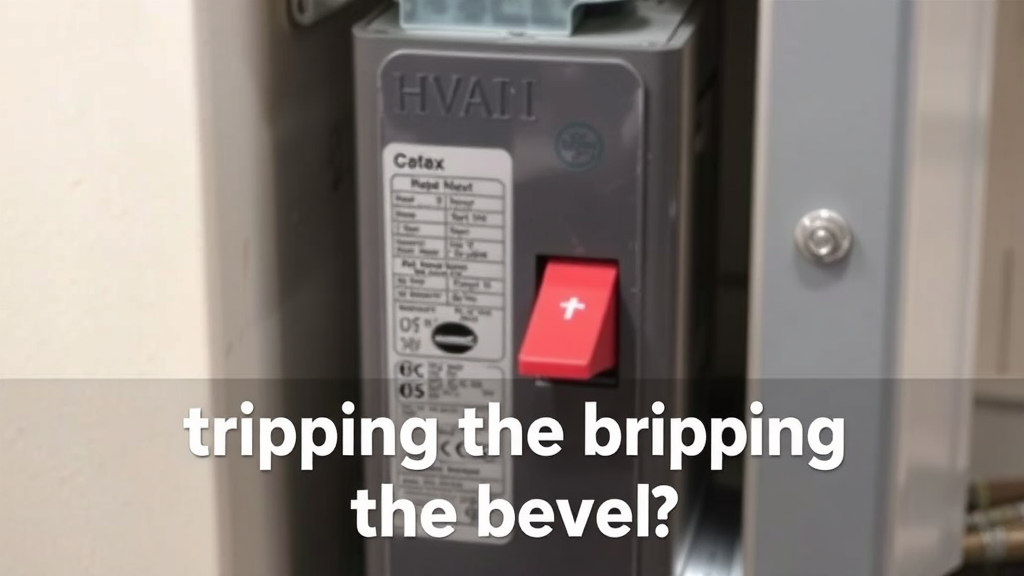
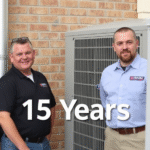

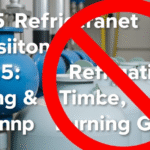
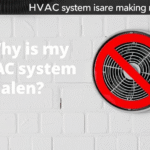
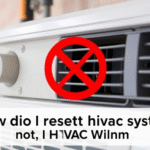
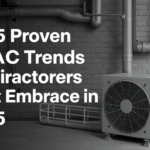
Leave a Reply